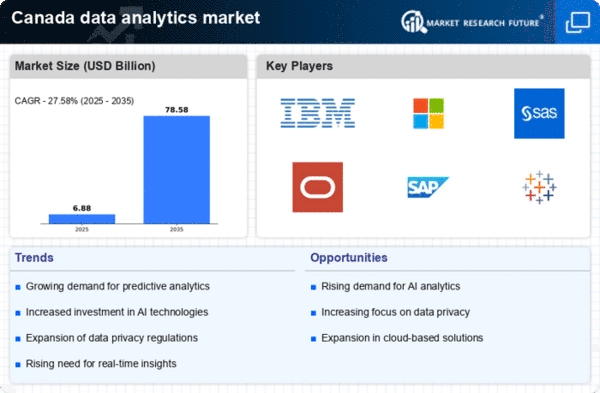Growing Demand for Real-Time Analytics
The data analytics market in Canada experiences a notable surge in demand for real-time analytics solutions. Organizations across various sectors are increasingly recognizing the value of immediate insights derived from data. This trend is particularly evident in industries such as retail and finance, where timely decision-making can significantly impact operational efficiency and customer satisfaction. According to recent estimates, the real-time analytics segment is projected to grow at a CAGR of approximately 25% over the next five years. This growth is driven by the need for businesses to respond swiftly to market changes and consumer behavior, thereby enhancing their competitive edge. As a result, the data analytics market is witnessing a shift towards technologies that facilitate real-time data processing and analysis, enabling organizations to harness the full potential of their data assets.
Increased Investment in Data Infrastructure
In Canada, the data analytics market is bolstered by substantial investments in data infrastructure. Organizations are increasingly allocating resources to enhance their data storage, processing, and management capabilities. This trend is driven by the growing volume of data generated daily, which necessitates robust infrastructure to support effective analytics. Recent reports indicate that Canadian businesses are expected to invest over $5 billion in data infrastructure by 2026, reflecting a commitment to leveraging data for strategic decision-making. Enhanced infrastructure not only improves data accessibility but also facilitates advanced analytics techniques, such as machine learning and predictive modeling. Consequently, the data analytics market is evolving, with organizations prioritizing investments that enable them to derive actionable insights from their data, ultimately leading to improved business outcomes.
Emergence of Advanced Analytics Technologies
The data analytics market in Canada is witnessing the emergence of advanced analytics technologies that are reshaping how organizations approach data analysis. Innovations such as machine learning, natural language processing, and predictive analytics are becoming increasingly prevalent, enabling businesses to extract deeper insights from their data. These technologies allow for more sophisticated analysis, facilitating the identification of trends and patterns that were previously difficult to discern. As organizations strive to remain competitive, the adoption of advanced analytics solutions is expected to grow, with projections indicating a potential market expansion of 30% in the next three years. This trend underscores the importance of the data analytics market in driving technological advancements that empower organizations to make data-driven decisions and optimize their operations.
Rising Importance of Data-Driven Decision Making
The data analytics market in Canada is significantly influenced by the rising importance of data-driven decision making among organizations. Companies are increasingly recognizing that leveraging data insights can lead to more informed strategies and improved operational performance. This shift is evident across various sectors, including healthcare, manufacturing, and marketing, where data analytics is being integrated into core business processes. A recent survey indicated that approximately 70% of Canadian executives believe that data-driven decision making is crucial for their organization's success. As a result, the data analytics market is witnessing a growing demand for tools and solutions that empower organizations to analyze data effectively and derive meaningful insights, thereby fostering a culture of data literacy and informed decision-making.
Expansion of Data Analytics Education and Training
The data analytics market in Canada is experiencing growth driven by the expansion of education and training programs focused on data analytics skills. As organizations seek to harness the power of data, there is a corresponding need for skilled professionals who can analyze and interpret complex datasets. Educational institutions and training providers are responding to this demand by offering specialized programs in data analytics, data science, and related fields. Recent statistics suggest that enrollment in data analytics courses has increased by over 40% in the past two years. This influx of trained professionals is expected to enhance the capabilities of the data analytics market, as organizations gain access to a workforce equipped with the necessary skills to leverage data effectively and drive innovation.
















